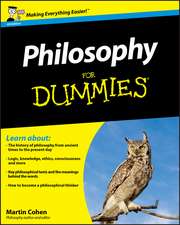The Eclipse of 'Elegant Economy': The Impact of the Second World War on Attitudes to Personal Finance in Britain
Autor Martin Cohenen Limba Engleză Paperback – 11 oct 2016
| Toate formatele și edițiile | Preț | Express |
|---|---|---|
| Paperback (1) | 338.33 lei 6-8 săpt. | |
| Taylor & Francis – 11 oct 2016 | 338.33 lei 6-8 săpt. | |
| Hardback (1) | 822.76 lei 6-8 săpt. | |
| Taylor & Francis – 28 feb 2012 | 822.76 lei 6-8 săpt. |
Preț: 338.33 lei
Preț vechi: 386.77 lei
-13% Nou
Puncte Express: 507
Preț estimativ în valută:
64.74€ • 67.77$ • 53.57£
64.74€ • 67.77$ • 53.57£
Carte tipărită la comandă
Livrare economică 05-19 aprilie
Preluare comenzi: 021 569.72.76
Specificații
ISBN-13: 9781138249905
ISBN-10: 1138249904
Pagini: 262
Dimensiuni: 156 x 234 mm
Greutate: 0.45 kg
Ediția:1
Editura: Taylor & Francis
Colecția Routledge
Locul publicării:Oxford, United Kingdom
ISBN-10: 1138249904
Pagini: 262
Dimensiuni: 156 x 234 mm
Greutate: 0.45 kg
Ediția:1
Editura: Taylor & Francis
Colecția Routledge
Locul publicării:Oxford, United Kingdom
Cuprins
Contents: Foreword, Lord Hennessy; Prologue; Introduction; Fleeting crescent (1918 to 1939 and before); Petrified 'capitalists' (the Second World War); Short dawn (1945 to 1947) First quartile (1948 to 1951) Dividend-seeking 'socialists' (the Co-operative Movement) Spreading shadow (1951 to 1957); Total eclipse and corona (1957 and beyond) Selected bibliography; Index.
Notă biografică
Dr Martin Cohen, Queen Mary University of London, UK.
Recenzii
'There has been extensive work on consumption, but very little on how people use or think about money. Accordingly, for anyone who wants to understand about the development of Britain's post-war consumer society this is the book.' Peter Catterall, Queen Mary University of London, UK 'An unusual premise [...] forms the backdrop for some interesting discussion. Cohen’s monograph sits somewhere between a conventional economic history and a cultural history of attitudes towards personal finance.' Twentieth Century British History 'This is an excellent, readable book, which draws on a wide range of archival material, in particular, bank and savings archives, as well as the mass observation archives at the University of Sussex... a must read for those interested in personal finance and for those wishing to study the unique case study of Britain in austerity during and after World War II.' Enterprise and Society
Descriere
With concepts of 'austerity' very much in the news, this book takes a fresh look at attitudes to consumption, consumerism and personal finance in Britain during the middle decades of the twentieth century. It argues that the pre-War fear of debt and social disdain for conspicuous consumption was replaced during the 1940s and 1950s by widespread acceptance of a consumer society. As the financial woes of the 21st century force a reassessment of the sustainability of a consumer-based society, this book provides a timely reminder of how attitudes to personal finance are of greater significance to cultural history than has often been acknowledged. With prudence and restraint once more the watchwords of a financially uncertain world, 'elegant economy' as Elizabeth Gaskell put it, may be back on the agenda.


